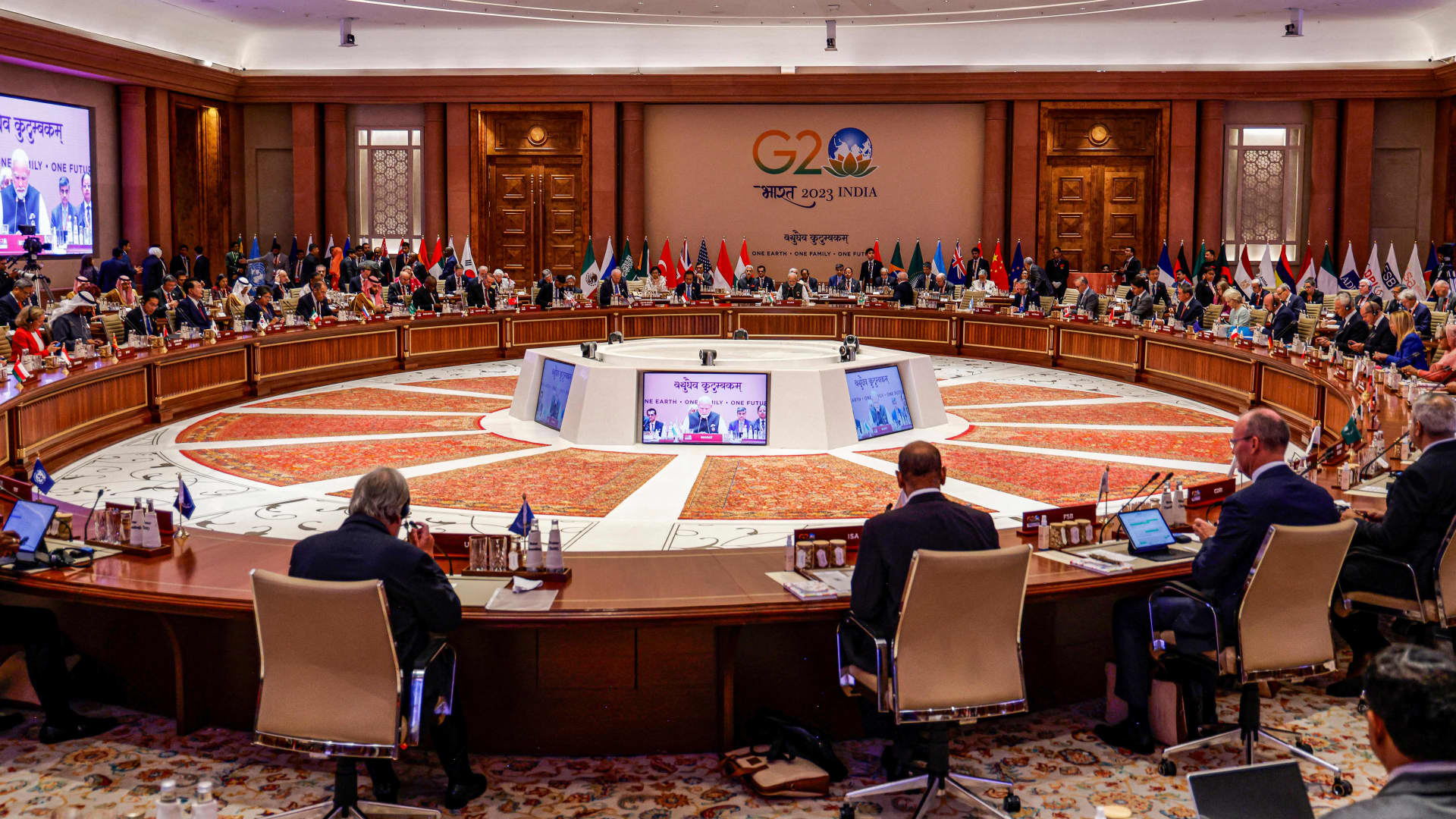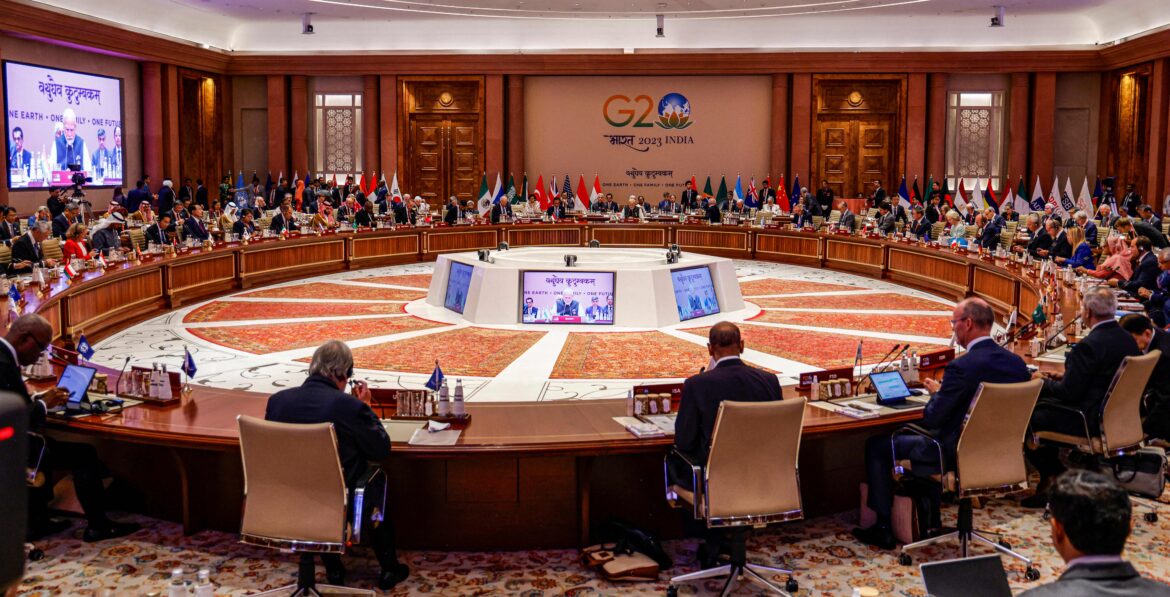
NEW DELHI — The African Union became the second regional grouping to be admitted to the Group of 20 leading industrialized and developing nations as a full permanent member, Indian Prime Minister Narendra Modi announced Saturday at the start of the two-day G20 leaders’ summit in Delhi.
The widely-anticipated move underscores India’s wide-ranging agenda to elevate the global multilateral forum’s focus on the Global South in its presidency of the G20 this year. The 55-member bloc of African nations joins the European Union as only the second regional organization to become a permanent member of the G20.
“India’s G-20 presidency has become a symbol of inclusion, both within the country and beyond, representing the spirit of ‘Sabka Saath’,” Modi said in his opening remarks, according to an official translation provided by India’s Ministry of External Affairs, referring to a “spirit of togetherness.”
“It was in the spirit of ‘Sabka Saath’ that India proposed permanent membership for the African Union in the G-20,” he added.
With an embrace after the announcement, Modi welcomed AU Chairperson Azali Assoumani and offered him a place at the conference table for permanent members of the G20.
The AU chair is rotated annually among the continent’s five regions. Assoumani is the president of the Comoros, an archipelago off the east coast of Africa.
“Delighted the African Union was granted full membership in the G20,” Charles Michel, president of the European Council, said on X, the social media platform formerly known as Twitter.
“EU has been a steadfast supporter of this initiative and I am pleased to have championed it from the very beginning with Macky Sall,” he added. Sall is Senegal’s president and was the 2022 chair of the African Union.
Weekend agenda
The summit is an important one for Modi, whose government has turned the normally sedate rotating G20 presidency into a branding vehicle to burnish India’s geopolitical importance ahead of national elections next year. Many governments, investors and businesses are also starting to look toward India — as China slows — which the International Monetary Fund expects to be the fastest growing economy this year.
This weekend’s agenda includes expediting climate action, mitigating the impact of geopolitics on food and energy security, the provision of more loans to developing nations by multilateral institutions and restructuring the world’s debt architecture as well as an international framework for cryptocurrencies.
“This period in the 21st century is the time to give the world a new direction,” Modi said. “It is a time in which age-old challenges are demanding new solutions from us, and therefore it is with a human-centric approach that we must fulfill each of our responsibilities and move forward.”
Underscoring the G20 focus on sustainable development and developing economies in the next few years, Brazil will assume the G20 presidency in 2024, with South Africa due to take over in 2025.
Brazilian President Lula da Silva, who is among the world leaders present in Delhi this weekend, said Saturday his government will launch the Task Force for Global Mobilization against Climate Change as G20 president next year.
“We hope to count on everyone’s engagement so that the beauty of the Earth is not just a photograph seen from space,” Lula said on X.
At a time of shifting global alliances, India is hoping to persuade the Global South that its deepening strategic partnership with the U.S. offers a more viable alternative from food security to debt resolution.
Nigerian Foreign Minister Yusuf Tuggar told CNBC Friday that Africa could look after its own interests when dealing with the West, specifically regarding critical minerals. Speaking to CNBC’s Tanvir Gill on the sidelines of the leaders’ summit he said: “We’re not that naïve.”
“Part of the problem coming out of colonialism to date has been the infantilization of African countries and Africans. So we know what is good for us,” Tuggar added. “It’s not like taking a toy out of a child’s hands, we know what our interests are, we are clear about them, we are confident, we can protect ourselves, we can hold our own.”
Other world leaders present in Delhi this weekend include Canadian Prime Minister Justin Trudeau, French President Emmanuel Macron, Germany’s Chancellor Olaf Scholz, Japan Prime Minister Fumio Kishida, Saudi Arabia’s Crown Prince Mohammed bin Salman, Turkey’s President Recep Tayyip Erdoğan and U.S. President Joe Biden.
Russian President Vladimir Putin and Chinese President Xi Jinping are conspicuous absentees, with both G20 member states having objected to the wording referring to the war in Ukraine. Russian Foreign Minister Sergey Lavrov and China Premier Li Qiang are representing their respective countries this weekend.
The pair’s absence has sparked fears that a communique binding member states may not be issued at the end of a G20 leaders’ summit — undercutting India’s clout and diminishing his domestic messaging.
“After Covid-19, a huge crisis of lack of trust has come in the world. Conflict has deepened this trust deficit,” Modi said. “Just as we can overcome Covid, we can also overcome this crisis of mutual trust.”
By CNBC

